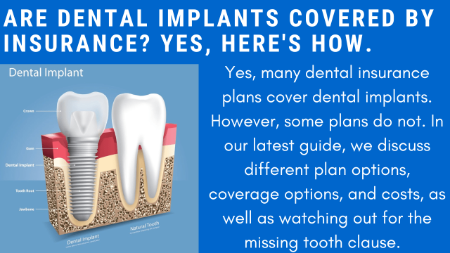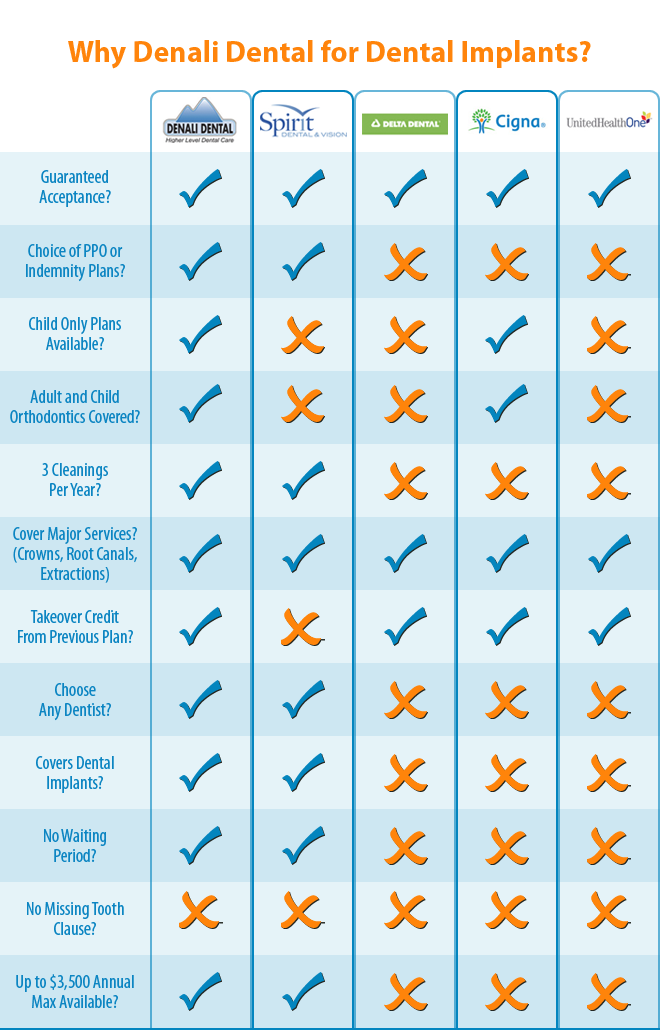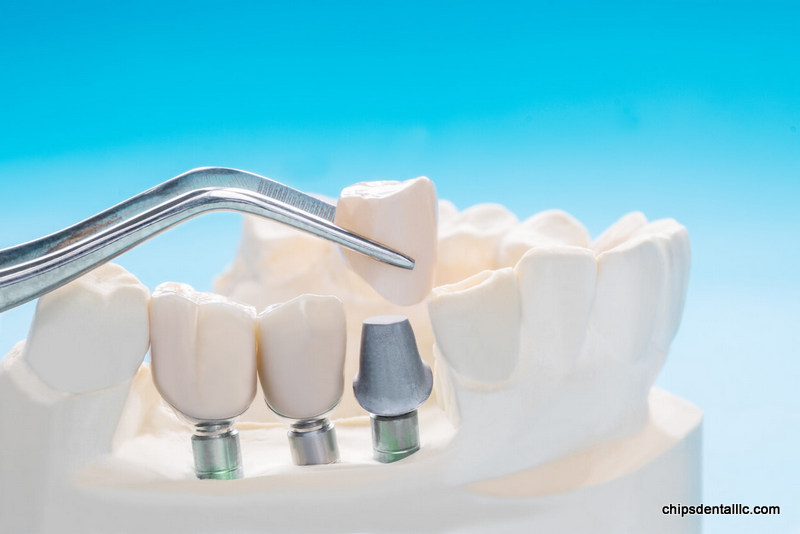Many dental insurance plans now offer coverage for dental implants, although the extent of coverage can vary widely. Before choosing a plan, it’s important to compare benefits and limitations regarding implants.
Shopping for dental insurance that includes implant coverage requires consideration of specific plan details. Dental implants have become a sought-after solution for missing teeth, offering durability and a natural look. Patients seeking implant procedures must ensure their selected dental insurance plan provides adequate coverage, as implants can be quite costly.
Some plans might only cover a portion of the implant procedure, or have certain stipulations like waiting periods. Consumers should thoroughly review the policy details, including the annual maximums, percentages of coverage, and potential out-of-pocket costs. An informed decision can lead to significant savings and ensure access to this highly effective dental treatment.

Credit: myfamilylifeinsurance.com
The Ins And Outs Of Dental Insurance For Implants
Diving into the world of dental insurance can be daunting. Especially when it comes to implants, understanding your coverage is crucial. Dental implants offer a permanent solution to tooth loss. Yet, many find themselves asking if their insurance plan has got them covered. Let’s unravel the mystery and make sense of dental insurance for implants.
Common Coverage Terms For Implants
Knowing the terminology in your policy is key. Here are terms often found in dental insurance plans that relate to implants:
- Annual Maximum: The top dollar amount an insurance company will pay within a year.
- Deductible: What you pay out-of-pocket before insurance kicks in.
- Co-insurance: A percentage of the treatment cost you share with your insurer after the deductible.
- Waiting Period: A time frame before certain benefits become available.
- Pre-Existing Conditions: A term for conditions present before your coverage start date.
Costs To Consider With Implant Insurance
Coverage plans vary widely, and dental implant insurance is no exception. Below are cost aspects to think about:
| Type of Cost | Explanation |
|---|---|
| Implant Surgery | Covers the actual insertion of the implant post into the jawbone. |
| Abutment and Crown | Fees for the attachment that connects the implant to the replacement tooth. |
| Diagnostic Procedures | Includes X-rays and CT scans required before surgery. |
| Bone Grafting | If you require additional jawbone support before implants. |
| Aftercare | Costs for follow-up visits and maintenance. |
Remember to review your policy to understand the specifics of your coverage. Speak to your dentist and insurance provider for accurate cost estimates. This will help ensure you are not caught off guard financially when opting for this transformative dental procedure.

Credit: thedentalimplantplace.com
Evaluating Your Dental Insurance Plan Options
Navigating the world of dental insurance can be tricky, especially when you’re looking for a plan that covers more
complex procedures like dental implants. Knowing the right questions to ask and factors to consider can make all the
difference in finding the best plan for your needs. Let’s delve into what makes some dental insurance plans more
beneficial than others, specifically for dental implant coverage.
Factors Influencing Implant Coverage
Dental insurance policies vary widely, and not all include implant coverage. Here’s what to look for:
- Annual maximums – Higher limits can better offset implant costs.
- Implant-specific coverage – Some plans provide this; many do not.
- Waiting periods – Immediate coverage is rare; check for delays.
- Co-insurance rates – Lower rates mean you pay less out-of-pocket.
Comparing Different Dental Plans
To make informed decisions, compare benefits alongside costs for a fair assessment of each plan. Look at the following:
| Type of Plan | Coverage | Cost |
|---|---|---|
| DHMO | Limited; Basic procedures | Lower premiums |
| PPO | Broader; Includes implants | Higher premiums |
| Indemnity | Flexible; Select your dentist | Varied premiums |
Reading reviews, and asking for recommendations can also guide your selection. Focus on plans known for quality implant coverage.
Select a plan that aligns with your dental care needs and financial situation for long-term oral health satisfaction.
Maximizing Benefits For Dental Implants
Dental implants are a popular and effective solution for missing teeth. They can boost confidence and improve dental health. To ensure these procedures don’t strain your finances, understanding and maximizing your dental insurance benefits is vital. Below are some essential strategies to enhance coverage and grasp how annual maximums come into play with implants.
Strategies To Enhance Coverage
Know Your Policy: Start by reading your insurance policy. Look for specifics about dental implants.
Pre-Approval Is Key: Seek pre-approval before the procedure. It confirms the extent of your coverage.
Supplemental Plans: Consider additional insurance if your current plan falls short.
Achieve Optimal Timing: Schedule your implant procedure at the start of the plan year. This strategy avoids hitting annual limits prematurely.
Payment Flexibility: If possible, spread the costs across two coverage years to maximize benefits.
Annual Maximums And How They Affect Implant Procedures
| Annual Maximum | Implant Coverage | Cost Strategy |
|---|---|---|
| Low Maximum | Limited | Delay procedure to next coverage year |
| Mid-Range | Partial | Split the procedure costs |
| High Maximum | Extensive | Pursue treatment without delay |
- Review your plan’s annual maximum. It is the top amount your insurer will pay within a year.
- Investigate if your insurance plan offers a rollover of unused annual benefits.
- Plan treatments around the annual maximum for lower out-of-pocket costs.
Limitations And Exclusions To Watch For
Dental insurance can be a lifesaver, especially when it covers procedures as expensive as implants. Not all plans are the same, though. It’s crucial to understand the limitations and exclusions in your policy. Let’s dive into some common hurdles you might face with dental insurance that promises to cover implants.
Pre-existing Conditions Clauses
Some insurance policies include pre-existing condition clauses. These can prevent coverage for teeth which were missing before the policy started. Be sure to check:
- The policy’s definition of pre-existing conditions
- How these conditions affect your implant coverage
- Any exceptions that might apply to your situation
Waiting Periods And How They Can Delay Coverage
Waiting periods are common in dental insurance policies. They mean you’ll wait before coverage kicks in. For implants, this period can be:
- Anywhere from 6 to 18 months
- Dependent on the insurance provider
During this time, out-of-pocket costs are necessary if you can’t wait. It’s essential to know:
| Insurance Provider | Waiting Period |
|---|---|
| Provider 1 | 12 months |
| Provider 2 | 6 months |
Always review the waiting period terms of your dental insurance plan. This avoids surprise expenses when you’re ready for an implant.
Alternative Financing Options For Implants
Explore dental insurance plans that cover implants, ensuring your smile receives the top-tier care it deserves. Uncover budget-friendly ways to support your dental health with policies that include implant procedures.
Introduction To Alternative Financing Options For Implants
Facing the high cost of dental implants can be daunting. Dental insurance often doesn’t cover implants, leaving patients seeking alternatives. Discover various options to finance this crucial procedure without breaking the bank.
Dental Discount Plans Versus Dental Insurance
- Dental discount plans provide reduced rates from participating dentists.
- No waiting periods or annual limits apply.
- Discount plans are not insurance but offer savings on various procedures.
| Feature | Dental Discount Plans | Dental Insurance |
|---|---|---|
| Costs | Low monthly subscription | Higher premiums |
| Coverage | Immediate discounts on services | May not cover implants fully |
| Waiting Period | None | Typically present |
| Annual Limits | None | Yes, can be restrictive |
Assess your needs to choose between dental discount plans and traditional dental insurance.
Flexible Spending Accounts And Health Savings Accounts
- A Flexible Spending Account (FSA) uses pre-tax dollars for medical expenses.
- FSAs are available through employers and have yearly use-it-or-lose-it policies.
- A Health Savings Account (HSA) is an option with high-deductible health plans.
- HSA funds roll over year to year and can grow tax-free.
- Both can be used for dental implant procedures, easing the financial burden.
Consult with your employer to understand FSA and HSA benefits for dental implants. Create a strategy to utilize these accounts for your healthcare expenses.

Credit: www.dentalinsuranceshop.com
Frequently Asked Questions On Dental Insurance That Covers Implants
What Dental Insurances Cover Implants?
Various dental insurance plans may cover implants, including private plans from providers like Delta Dental, Cigna, and Aetna, as well as some employer-sponsored and marketplace options.
How Much Do Implants Cost With Insurance?
With insurance, the cost for dental implants can significantly reduce, sometimes covering 50% of the procedure, although it greatly depends on the specific terms of your insurance plan.
Are Implants Considered A Cosmetic Procedure?
While dental implants can improve appearance, they’re often not labeled purely cosmetic, as they also restore function and prevent bone loss, thus many insurance plans offer coverage.
Conclusion
Selecting the right dental insurance for implants can be transformative. It’s about finding a balance between comprehensive coverage and affordability. As we’ve explored, several options cater to diverse needs and budgets. Remember, the perfect plan is out there, ready to restore your smile with this essential treatment.
Start your search informed, and smile with confidence.

